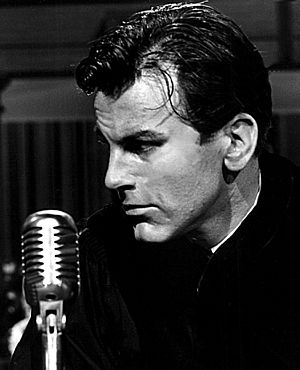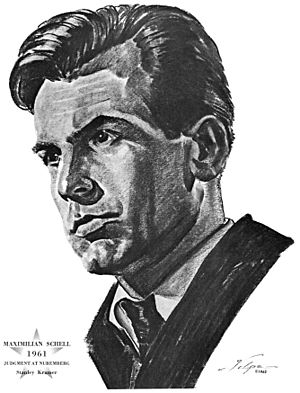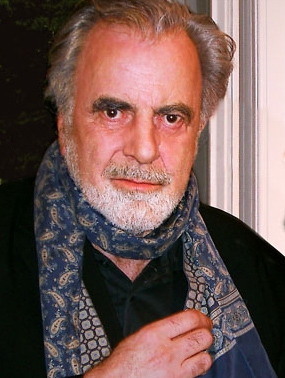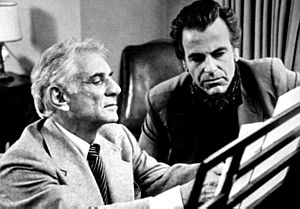Maximilian Schell facts for kids
Quick facts for kids
Maximilian Schell
|
|
|---|---|
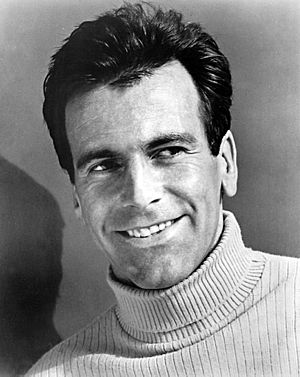
Schell in 1970
|
|
| Born | 8 December 1930 Vienna, Austria
|
| Died | 1 February 2014 (aged 83) Innsbruck, Austria
|
| Citizenship |
|
| Occupation |
|
| Years active | 1955–2014 |
| Spouse(s) |
Natalya Andrejchenko
(m. 1985; div. 2005)Iva Mihanovic
(m. 2013) |
| Children | 1 |
| Relatives | Maria Schell (sister) |
Maximilian Schell (born December 8, 1930 – died February 1, 2014) was a famous actor from Austria and Switzerland. He also wrote, directed, and produced his own films. He won an Academy Award for Best Actor (an Oscar!) for his role in the 1961 American movie Judgment at Nuremberg. This was only his second acting job in Hollywood.
Maximilian grew up in a family deeply involved in arts and literature. When he was a child, his family moved to Switzerland in 1938. They left Austria because Nazi Germany took over the country. After World War II ended, Schell became a full-time actor and director. He appeared in many German films, often about the horrors of war, before moving to Hollywood.
Schell spoke both English and German very well. He starred in many movies about the Nazi era. Two of these films earned him Oscar nominations: The Man in the Glass Booth (1975) and Julia (1977). He played many different kinds of people, from leaders like Simón Bolívar to scientists like Albert Einstein. He even won a Golden Globe Award for playing Vladimir Lenin in the TV movie Stalin (1992).
Beyond acting, Schell was a talented pianist and conductor. He performed with famous musicians like Claudio Abbado and Leonard Bernstein. His older sister, Maria Schell, was also a well-known actress. Maximilian made a documentary film about her called My Sister Maria in 2002.
Contents
Early Life and Education
Maximilian Schell was born in Vienna, Austria. His mother, Margarethe, was an actress who ran an acting school. His father, Hermann Ferdinand Schell, was a Swiss poet, writer, and pharmacist. His family was Roman Catholic.
Maximilian's father wasn't sure about him becoming an actor. He thought it might not lead to "real happiness."
In 1938, the Schell family left Vienna to escape Hitler and the Nazis. They moved to Zurich, Switzerland, after Austria was taken over by Nazi Germany.
In Zurich, Schell grew up reading classic books. When he was ten, he wrote his first play. He remembered that acting felt normal because he was always around theater. At first, he wanted to be a painter, musician, or playwright, like his father.
Later, Schell studied at the University of Zurich for a year. He also played soccer and was on the rowing team. He worked as a part-time journalist to earn money. After World War II, he moved to Germany and studied philosophy and art history at the University of Munich.
Schell then returned to Zurich and served in the Swiss Army for a year. He continued his studies in London, Zurich, and Basel. He began his acting career at the Basel Theatre. His older sister, Maria Schell, and his other siblings, Carl and Immaculata, were also actors.
Acting Career Highlights
Maximilian Schell's first movie was the German anti-war film Kinder, Mütter und ein General (Children, Mothers, and a General) in 1955. This movie was about mothers who faced a German general. They learned their sons, some as young as 15, were being sent to fight in a losing war. Schell played an officer who left the army. This kind of role, showing his sensitive side, became common for him.
After seven more films in Europe, Schell came to the U.S. He acted in a Broadway play called "Interlock" in 1958. He made his Hollywood debut in the World War II movie, The Young Lions (1958). He played a German officer in another anti-war story, alongside stars like Marlon Brando.
In 1960, Schell went back to Germany to play the main role in William Shakespeare's Hamlet for German TV. He played Hamlet two more times on stage. Many people consider him one of the greatest Hamlets ever. Schell said that playing Hamlet for the first time felt like "falling in love with a woman." He realized then how much he loved acting.
Judgment at Nuremberg (1961)
In 1959, Schell played a defense lawyer in a live TV show called Judgment at Nuremberg. This show was a made-up story based on the real Nuremberg War Trials. His performance was so good that he was chosen to play the same part in the 1961 movie version. He won an Academy Award for Best Actor for this role. He was the first German-speaking actor to win an Oscar since World War II.
Schell played his role very well. He tried to defend his clients, who were Nazi judges. He argued that all Germans shared the blame for what happened. To prepare, Schell read all forty volumes of the real Nuremberg trials records.
The movie had many famous actors, including Spencer Tracy and Burt Lancaster. They worked for less money because they wanted to be part of this important film. Judgment at Nuremberg was nominated for eleven Academy Awards and won two. In 2011, Schell attended a special event celebrating the film's 50th anniversary and his Oscar win.
Making His Own Films
Starting in 1968, Maximilian Schell began to write, produce, direct, and act in his own movies. One of these was The Castle (1968). It was a German film about a man stuck in a confusing system of rules. Soon after, he made Erste Liebe (First Love) (1970), which was nominated for an Academy Award for Best Foreign Language Film.
Schell's next film, The Pedestrian (1974), was about a German businessman who was troubled by his past during the Nazi era. This movie explored feelings of guilt and responsibility. It was also nominated for an Oscar and was very successful in Germany.
He also produced, directed, and acted in End of the Game (1975), a German crime thriller. A few years later, he helped write and directed the Austrian film Tales from the Vienna Woods (1979).
Roles About World War II
As one of the few German-speaking actors in English films, Schell often starred in movies about Nazi Germany. These included Counterpoint (1968), The Odessa File (1974), and Julia (1977). For Julia, Schell was nominated for another Oscar for his role as someone who fought against the Nazis.
Schell also played Jewish characters in several films. He was Otto Frank, Anne Frank's father, in The Diary of Anne Frank (1980). He played a modern Zionist father in The Chosen (1981). In 1996, he played a person who survived Auschwitz in the German film Through Roses. In Left Luggage (1998), he played the father of a Jewish family.
In The Man in the Glass Booth (1975), Schell played a character with two identities: a Nazi officer and a Jewish person who survived the Holocaust. This role was very complex. Schell's acting in this film was highly praised. He was nominated for an Academy Award for Best Actor and a Golden Globe Award for this performance.
Playing Many Different Characters
To avoid playing the same type of character, Schell took on many different roles throughout his career. He played a museum thief in Topkapi (1964). He was a Venezuelan leader in Simón Bolívar (1969). He played a ship captain in Krakatoa, East of Java (1969). In the science fiction film The Black Hole (1979), he was a scientist and spaceship commander.
He played the Russian emperor in the TV series Peter the Great (1986), which won an Emmy Award. He had a funny role with Marlon Brando in The Freshman (1990). He played Vladimir Lenin in the TV series Stalin (1992), winning a Golden Globe Award. He was also the Pharaoh in Abraham (1994), and Tea Leoni's father in the science fiction movie Deep Impact (1998).
From the 1990s, Schell appeared in many German TV films. In 2007, he played Albert Einstein in the German TV series Giganten (Giants). This show featured the lives of important people in German history.
Documentary Films
Schell also wrote, produced, and directed films. One of his documentaries was Marlene (1984), about the famous actress Marlene Dietrich. It was nominated for an Oscar. Dietrich, who was 83 at the time, agreed to be interviewed but did not want to be filmed. Schell cleverly showed only her silhouettes and old film clips during their interview.
In 2002, Schell produced My Sister Maria, a personal documentary about his sister, actress Maria Schell. The film showed her life, career, and how she became ill. It was made three years before her death. In 2002, both Maximilian and Maria received Bambi Awards for their achievements and for the film.
Personal Life and Hobbies
Maximilian Schell was a very good pianist for most of his life. He enjoyed playing for hours to relax and renew himself. Conductor Leonard Bernstein said Schell was a "remarkably good pianist." In 1982, Schell read from Beethoven's letters on a TV program before Bernstein conducted Beethoven symphonies.
In 1983, Schell and Bernstein co-hosted an 11-part TV series called Bernstein/Beethoven. It featured live symphonies and discussions about Beethoven's music.
Schell also worked with other famous conductors like Claudio Abbado. He directed live operas, including Richard Wagner's Lohengrin. He was a guest professor at the University of Southern California.
Death
Maximilian Schell passed away on February 1, 2014, in Innsbruck, Austria. He was 83 years old. He had been receiving treatment for pneumonia. His funeral was attended by many friends and colleagues. He is buried in Preitenegg/Carinthia, Austria, where his family home was located.
Filmography
| Title | Year | Role | Notes |
|---|---|---|---|
| Kinder, Mütter und ein General | 1955 | Deserteur | |
| The Plot to Assassinate Hitler | 1955 | Member of the Kreisau Circle | |
| Ripening Youth | 1955 | Jürgen Sengebusch | |
| The Girl from Flanders | 1956 | Alexander Haller | |
| The Marriage of Doctor Danwitz | 1956 | Dr. Oswald Hauser | |
| A Heart Returns Home | 1956 | Wolfgang Thomas | |
| The Last Ones Shall Be First | 1957 | Lorenz Darrandt | |
| The Young Lions | 1958 | Captain Hardenberg | |
| Ein wunderbarer Sommer | 1958 | Josef Ospel | |
| Hamlet | 1961 | Hamlet | Television film. Used in an episode of Mystery Science Theater 3000 |
| Judgment at Nuremberg | 1961 | Hans Rolfe | Academy Award for Best Actor Golden Globe Award for Best Actor – Motion Picture Drama New York Film Critics Circle Award for Best Actor Nominated – BAFTA Award for Best Actor in a Leading Role Nominated – Laurel Award for Top Male Dramatic Performance |
| Five Finger Exercise | 1962 | Walter | |
| The Condemned of Altona | 1962 | Franz von Gerlach | |
| The Reluctant Saint | 1962 | Giuseppe | |
| Topkapi | 1964 | Walter Harper | |
| Return from the Ashes | 1965 | Stanislaus Pilgrin | |
| The Doctor and the Devil | 1965 | ||
| The Deadly Affair | 1967 | Dieter Frey | |
| The Desperate Ones | 1967 | Marek | |
| Counterpoint | 1968 | General Schiller | |
| The Castle | 1968 | 'K.' | |
| Heidi | 1968 | Richard Sessemann | Television film |
| Krakatoa, East of Java | 1968 | Captain Hanson | |
| Simón Bolívar | 1969 | Simón Bolívar | |
| Erste Liebe | 1970 | Father | San Sebastián International Film Festival Silver Seashell Nominated – Academy Award for Best Foreign Language Film |
| Paulina 1880 | 1972 | Michele Cantarini | |
| Pope Joan | 1972 | Adrian | |
| The Pedestrian | 1973 | Andreas Giese | Golden Globe Award for Best Foreign Language Film Nominated – Academy Award for Best Foreign Language Film |
| The Odessa File | 1974 | Eduard Roschmann | |
| The Rehearsal | 1974 | ||
| The Man in the Glass Booth | 1975 | Arthur Goldman | Nominated – Academy Award for Best Actor Nominated – Golden Globe Award for Best Actor - Motion Picture Drama |
| Der Richter und sein Henker | 1975 | Robert Schmied on Audiotape | Voice, Uncredited role San Sebastián International Film Festival Silver Seashell |
| The Day That Shook the World | 1975 | Djuro Sarac | |
| St. Ives | 1976 | Dr. John Constable | |
| Cross of Iron | 1977 | Hauptmann von Stransky | |
| A Bridge Too Far | 1977 | SS-Obergruppenführer and General of the Waffen-SS Wilhelm Bittrich | |
| Julia | 1977 | Johann | New York Film Critics Circle Award for Best Supporting Actor Nominated – Academy Award for Best Supporting Actor Nominated – Golden Globe Award for Best Supporting Actor Nominated – National Society of Film Critics Award for Best Supporting Actor |
| Players | 1979 | Marco | |
| Geschichten aus dem Wienerwald | 1979 | Theatre Visitor | Uncredited |
| Avalanche Express | 1979 | Col. Nikolai Bunin | |
| Together? | 1979 | Giovanni | |
| The Black Hole | 1979 | Dr. Hans Reinhardt | |
| The Diary of Anne Frank | 1980 | Otto Frank | Television film |
| Arch of Triumph | 1980 | ||
| The Chosen | 1981 | Professor David Malter | |
| The Phantom of the Opera | 1983 | Sándor Korvin/The Phantom of the Opera | Television film |
| Les Îles | 1983 | Fabrice | |
| Man Under Suspicion | 1984 | Lawyer Landau | |
| The Assisi Underground | 1985 | Col. Müller | Television film 175 minutes |
| Peter the Great | 1986 | Peter the Great | TV miniseries |
| Laughter in the Dark | 1986 | ||
| An American Place | 1988 | Alfred Steiglitz | |
| The Rose Garden | 1989 | Aaron | |
| The Freshman | 1990 | Larry London | |
| Young Catherine | 1991 | Frederick the Great | |
| Labyrinth | 1991 | ||
| Miss Rose White | 1992 | Mordecai Weiss | Television film Nominated – Primetime Emmy Award for Outstanding Lead Actor in a Miniseries or a Movie |
| Stalin | 1992 | Vladimir Lenin | Television film CableACE Award for Supporting Actor in a Movie or Miniseries Golden Globe Award for Best Supporting Actor - Series, Miniseries or Television Film Nominated – Primetime Emmy Award for Outstanding Supporting Actor in a Miniseries or a Movie |
| A Far Off Place | 1993 | Colonel Mopani Theron | |
| Justice | 1993 | Isaak Kohler | |
| Candles in the Dark | 1993 | Colonel Arkush | Television film Also director |
| Abraham | 1994 | Pharaoh | Television film |
| Little Odessa | 1994 | Arkady Shapira | |
| The Thorn Birds: The Missing Years | 1996 | Cardinal Vittorio | TV miniseries |
| The Vampyre Wars | 1996 | Rodan | |
| Through Roses | 1997 | Carl Stern | |
| Telling Lies in America | 1997 | Dr. Istvan Jonas | |
| The Eighteenth Angel | 1998 | Father Simeon | |
| Left Luggage | 1998 | Mr. Silberschmidt | |
| Vampires | 1998 | Cardinal Alba | |
| Deep Impact | 1998 | Jason Lerner | |
| Joan of Arc | 1999 | Brother Jean le Maistre | TV miniseries |
| Wer liebt, dem wachsen Flügel... | 1999 | Hochberg | |
| I Love You, Baby | 2000 | Walter Ekland | |
| Fisimatenten | 2001 | Poser | |
| Festival in Cannes | 2001 | Viktor Kovner | |
| Coast to Coast | 2003 | Casimir | Television film |
| Der Fürst und das Mädchen | 2003–2007 | Fürst Friedrich von Thorwald | TV series |
| Die Rückkehr des Tanzlehrers | 2004 | Fernando Hereira | Television film |
| Die Liebe eines Priesters | 2005 | Pater Christoph | Television film |
| The House of Sleeping Beauties | 2006 | Kogi | |
| The Shell Seekers | 2006 | Lawrence Sterne | TV miniseries |
| Die Rosenkönigin | 2007 | Karl Friedrich Weidemann | Television film |
| The Brothers Bloom | 2008 | Diamond Dog | |
| Flores negras | 2009 | Jacob Krinsten | |
| Les brigands | 2015 | Mr. Escher | (final film role; filmed in 2012) |
Other Awards and Nominations
- 1961: Academy Award (Best Actor), Judgment at Nuremberg
- 1965: Ondas Award (Best Actor)
- 1979: Golden Hugo Award for Tales from the Vienna Woods
- 1980: German Film Award in Silver (program-filling feature film) for Tales from the Vienna Woods
- 1984: German Film Award, Film Award for the role Morning in Alabama
- 1985: Golden Globe nomination (documentary) for Marlene
- 1985: Merit Cross 1st Class of the Federal Republic of Germany (Verdienstkreuz 1. Klasse)
- 1985: Nominated for Academy Award for Documentary Feature for Marlene
- 1990: Honorary Award of the German Film Award
- 1992: Emmy Award nomination (Best Actor) in the TV film Miss Rose White
- 1999: Method Fest for Lifetime Achievement
- 1999: Platinum Romy for Lifetime Achievement
- 2000: Satellite Award, Mary Pickford Award for Lifetime Achievement
- 2002: Austrian Cross of Honour for Science and Art, 1st class
- 2002: Bambi Award
- 2006: Honorary Award of the Bavarian Film Awards for artistic mastery and humanism
- 2008: Diva Award for Lifetime Achievement
- 2009: Premio Roma
- 2009: Bambi Award for Lifetime Achievement
- 2011: Honorary Award of the Bernhard Wicki Film Award – The Bridge
See also
 In Spanish: Maximilian Schell para niños
In Spanish: Maximilian Schell para niños
 | Lonnie Johnson |
 | Granville Woods |
 | Lewis Howard Latimer |
 | James West |


